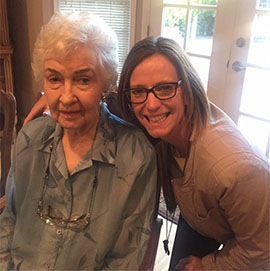There’s usually a sign. Maybe your mother had a bad fall, forgot to pay her bills or is unable to keep up with her medications. Whatever the reason, nearly all families will come to a point when they realize a loved one can’t fully or safely take care of daily tasks. With the first wave of baby boomers entering their 70s, elder care is a growing need for Bay Area families. Understanding the care options that are available can help families make choices that will bring everyone comfort and peace of mind.

The best caregivers will focus on building strong, trusting relationships. Photo: Interim HealthCare of Santa Rosa (2017)
In-Home Care
If your loved one needs some assistance with chores, errands or self-care, in-home care may be the best fit. Crystal Smith, manager of Interim HealthCare of Santa Rosa, says the key to a positive in-home care experience is building a strong relationship between the caregiver and the family. “When you’re researching elder care, word of mouth and online reviews are important, but you also need to have a good gut feeling about the provider.”
Ms. Smith offers the following suggestions when searching for someone to care for your loved one: “The caregiver should ask lots of questions at the beginning so he or she can completely understand your family’s situation and specific needs. You want to work with someone who’s fully engaged and committed to building a personal relationship with the individual and the family. Also, the caregiver should be licensed and bonded, which is an important protection.”
Ms. Smith says introducing a caregiver to your loved one may require some tact. “This generation we’re working with now is quite proud. Being taken care of is a real adjustment for them, and families need to take those feelings into account.” Again, she recommends starting to build the caregiver-patient relationship early so your loved one can ease into the new daily rhythms.
At the same time, you may feel nervous about letting a stranger into your loved one’s home. “This can be a scary transition for some families, and that’s important to acknowledge,” says Ms. Smith. “I think it’s important to identify specific fears, like theft or safety, and then talk about the underlying causes of those fears. This is another reason why cultivating good relationships is so important.”
After finding the right person, Ms. Smith often finds that tight bonds start to grow. “Obviously, caregivers keep their professional boundaries, but this is intimate work and they do get emotionally attached. A caregiver can really become part of the family.”
Facility Care
Some families will determine that the best place for their loved ones to receive care is outside the home. Ms. Smith notes that an assisted living facility may be the best solution for a loved one who likes lots of socialization, activities and group meals. While assisted living is appropriate for individuals who need a few hours of care each day, only skilled care facilities offer round-the-clock nursing.
If your loved one needs full-time care, Debbie Allen, administrator at Marin Convalescent & Rehabilitation Hospital, recommends visiting several locations. “Take a look around. Do the patients look happy? Do they look clean? Are they engaged in activities or sitting alone?” Ms. Allen also recommends choosing a facility with a low patient-to-staff ratio. “When there are fewer patients, the staff will know more about the residents’ needs and be better able to meet them.” Families will also need to research insurance coverage to determine what their loved ones qualify for. Medi-Cal and Medicare will provide payment for some facilities but not others.
Ms. Allen says families who bring loved ones to care facilities should expect the transition period to last about a month. “We may turn to families for help during this time if there’s a situation where the patient becomes especially frightened or upset. Each patient is an individual, and the families often have the best sense of how their loved ones can feel more at ease.”
To find a Diamond Certified care provider in your area, visit www.diamondcertified.info.
